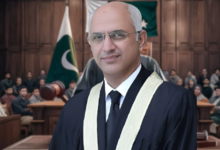There is a temple in Islamabad where Hindus are not allowed to worship inside
The CDA has apparently preserved the temple as heritage but violating its sanctity by allowing restaurants and shops to operate on the premises of the Ram Mandir: Rights Activist Kapil Dev

By SR Tanoli
Islamabad: There is no place in Islamabad for Hindu religious gatherings while there is a centuries old temple facility where Hindus are not allowed to pray inside.
Ram Mandir Temple, located in Saidpur Village of Islamabad, was constructed by Raj Man Singh in 1580 AD. It has remained a center for Hindu and Sikh religious gatherings before the independence of Pakistan.
The temple has been closed for any kind of Hindu religious practices since 1947. Likewise, other tourists, Hindus can visit the Temple but are not allowed to worship there due to the fear of conflict.

The historic temple hosts no deities and idols as they were removed during renovation work done by the Capital Development Authority (CDA) in 2005. Now the temple is all but subsumed into a touristy strip of restaurants and handicrafts.
People belonging to the Hindu community visit the temple and many of them have expressed their desire to offer worship here, but for the fear of violence, they are not being allowed, said Nasarullah Khan, In-charge security team at Ram Mandir.
The temple is under the CDA’s control which has deployed a team of security guards to brief visitors about the historical importance of the temple and generating revenue by renting temple premises for commercial productions.
There are around 2,000 Hindus living in Islamabad, and they are ‘forced’ to visit Rawalpindi and other surrounding regions for performing their religious practices as the capital city lacks the facility to perform their religious rituals and other related services.

The development authority has apparently preserved the site as heritage but violating its sanctity by allowing restaurants and shops to operate on the premises of the Ram Mandir, said Kapil Dev, a human rights activist based in Sindh.
If the state opens the Mandir for Hindu religious services, it will have to remove all encroachments and business from there, He, however, said measures in this regard seem blurry.
The ponds were not preserved during the renovation work done by CDA, said Kapil Dev, adding that the area where ponds were built over was handed over to restaurants where now people are being served meat dishes, which disgrace the sanctity of a sacred place for Hindu.
Dev further said at present, the only temple available for prayers is Krishna Mandir in Saddar Rawalpindi and a temple in Islamabad is needed for the city’s residents.
Supporting the construction of a new temple, he said, there are many complications if the state opens Ram Mandir for religious services.
The human rights activist said the temple should be in the control of Evacuee Trust like other worship places but it is under the authority of the CDA, which is a ‘violation of the concerned protocol’.

The Hindu community desperately needs a religious complex where it can perform its religious rituals as the proposed complex comprises a community hall, shamshanghat, Mandir and other sections of religious needs, lamenting that construction of much needed complex had been stopped to make a group of people happy.
He said everything is possible but if the state demonstrates its power, adding that it’s the state’s responsibility to show its will and control over anti-minorities elements in the country, he maintained.
Encroached by Businesses
The Ram Mandir was spread over a few kanals of land, but a large area of the temple is encroached now by food businesses and handicraft shops. A CDA official on condition of anonymity said that the temple property was spread over to the stairs of the food restaurant [Des Pardes].
According to the document available with The Reporters, the CDA has leased 2,865 & 320 square feet open and 979 square feet covered area to Des Pardes ,owned by Tauqeer Ahmed, on Rs58, 740 per month charges along with Rs178, 150 outstanding dues.
However, the open area of the restaurant is now spread over kanals where the restaurant staff hosts hundreds of customers on a daily basis.
The official, when asked why the competent authority doesn’t remove encroachments, said how it is possible that officers who enjoy free meals along with their guests and families can take action against encroachments.
Similarly, Nomad Art Gallery has no leased area but it has covered 736 square feet area of the Temple for Rs34,380 per month fee and Rs262,171 outstanding dues. However, the encroached property has been sealed since 2016, according to the CDA document.

Besides, there are many small shops and cafes open in the premises of the temple, restricting the temple within its building structure.
No Harm, Yet Not Allowed
Religious Affairs and Inter-faith Harmony Minister Pir Noorul Haq Qadri forwarded the matter to the Council of Islamic Ideology (CII) for its advice along with a summary of grant of Rs100 million to the Prime Minister for the construction of the complex building structure.
In October last year, the CII, in its advice, said that there are no Constitutional or Sharia restrictions on the construction of a temple in Islamabad or any other part of the country. The decision was signed by 14 members of the Council of Islamic Ideology (CII).
Hindus like all other religious groups in the country have the constitutional right to a place for rites according to their faith, the signed document stated.
Islamabad is hereby accorded in accordance with clause 4.1.1 of the Islamabad Capital Territory, Building Control Regulations 2020 ensuring that height of this boundary wall shall not accord 7-0, says the notification copy which is available with this correspondent.
Nearly six months later the work at the site was stopped apparently because of the pressures from some hardliners who warned the government not to allow the construction of the temple in Islamabad.
Despite, we have forgiven alleged attackers of the under construction temple in Islamabad, neither the cremation ground could be constructed, nor compensation amount committed by the attackers could be recovered, lamented Dr Ramesh Kumar, minorities representative.
Council of Islamic Ideology Chairman QiblaAyaz, when approached on the matter, said the religious ministry had referred the matter to the CII and it said that there are no constitutional or Sharia restrictions on the construction of a temple in Islamabad.
He said the progress in the construction work of cremation ground is pending for the CDA decision. Qibla Ayaz further said that the state has decided to hand over Ram Mandir to Hindu community for its religious obligations, adding that Hindu council has agreed with the government proposal also.
However, many Hindu community leaders have opposed the conversion of Ram Mandir into a worship place as they said presence of food restaurants in the temple premises disgrace the sanctity of this place.
CDA Nasarullah said the Hindu community leaders have already expressed concern over the presence of a gurdwara in the Mandir premises as well as a mosque in the nearby location, adding that Hindu leaders are feared that violent clashes can erupt for any such development.
Retrospect
Soon after independence of Pakistan, a trust was established under the federal law, called the Evacuee Trust Property Board (ETPB), to manage the places of worship that were left behind by HRs, states an HRCP report.
The Board has a list of worship places of the RMs but Ram Mandir is not included in that list as the temple is controlled by the CDA, it mentions.
The HRCP report further states that there are 350 temples and gurdawaras in Hyderabad alone, and only between five to ten are privately managed, and the rest were either occupied or have been sold.
It is to mention here that this Board was entrusted with the upkeep and protection of the properties of RMs. The Board doesn’t have the right to sell any of these properties. However, much of the land under the Board’s control has been left uncared for and has been occupied or sold. Only one temple is currently still maintained by the Evacuee Trust Property Board, the report further mentions.
What does the Constitution Guarantee?
The Constitution of Pakistan, in its article 25 (1), guarantees that “all citizens are equal before law and are entitled to equal protection of law”.
Similarly, article 5 of the Constitution guarantees that “adequate provision shall be made for the minorities to freely profess and practice their religion and develop their culture.” Article 33 declares that it is the state’s responsibility to discourage racial, tribal, sectarian, and provincial prejudices among citizens.
The June 19, 2014 verdict of the Supreme Court of Pakistan also ensures protection of the RMs and their religious places in Pakistan. The apex court ruling clearly directed the state to take measures to ensure the protection of the worship places of the RMs and established a special security force to deploy on the security of the worship places.




